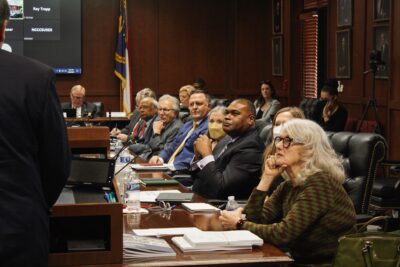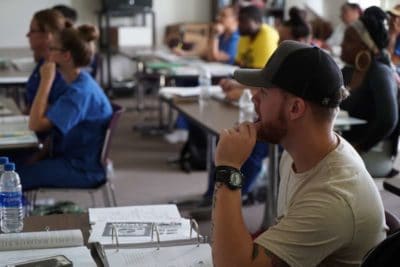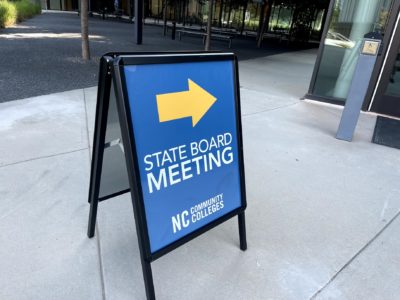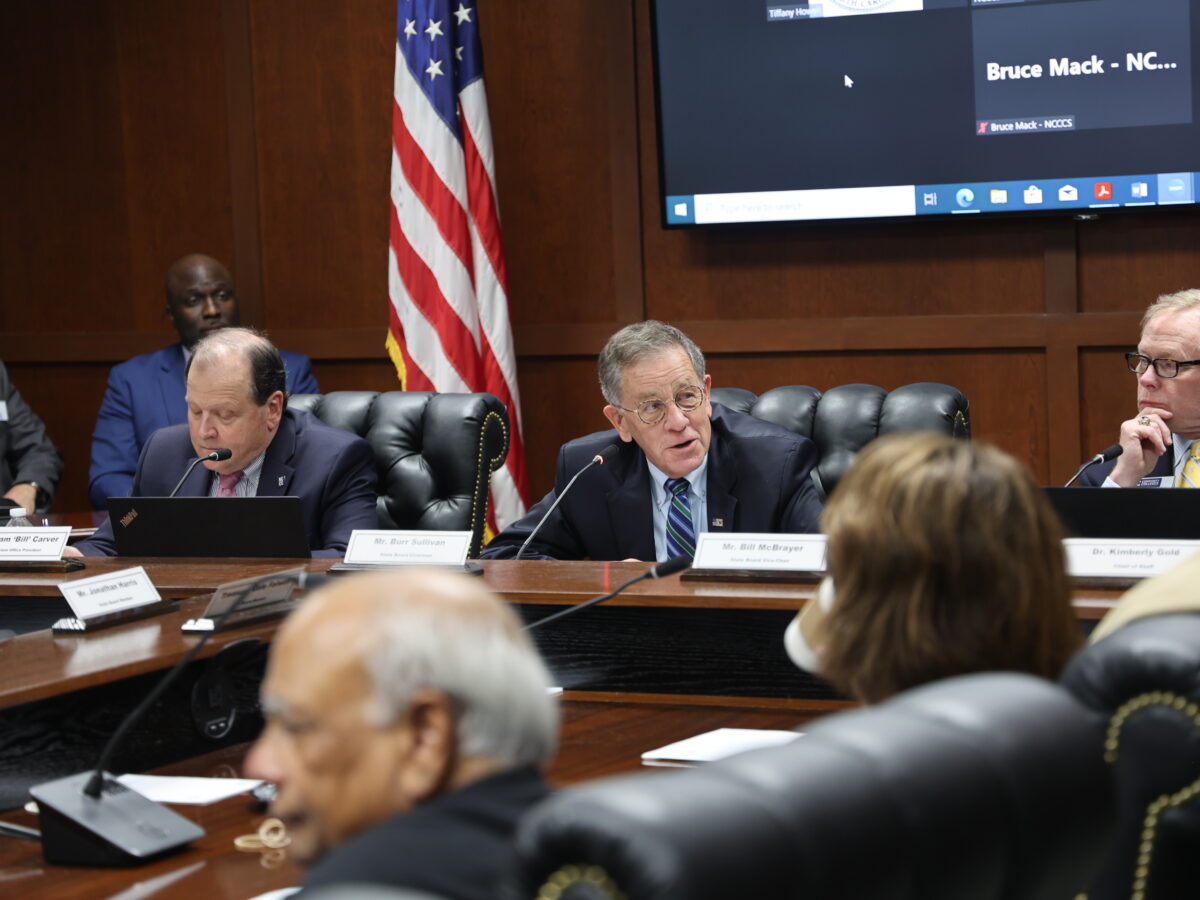
Share this story
- “Workforce is the name of the game,” said Chair Burr Sullivan. “We’ve been doing it a long time, but the expectations coming our way from all over the state have just been increasing. We just have to deliver.”
- Several N.C. Community College System and State Board of Community College leaders highlighted the need to increase funding for workforce development initiatives and come up with new models to encourage collaboration.
|
|
North Carolina’s workforce was at the forefront of the State Board of Community Colleges meeting Feb. 16-17, with the Board discussing how the N.C. Community College System (NCCCS) is addressing the state’s labor shortage and potential solutions moving forward.
“Workforce is the name of the game,” said Chair Burr Sullivan. “We’ve been doing it a long time, but the expectations coming our way from all over the state have just been increasing. We just have to deliver.”
The state’s 58 community colleges have long played an important role in training skilled workers. Community colleges offer both curriculum courses, which are designed to lead to a transfer degree, and workforce/continuing education courses, which include stand-alone courses and short-term programs focused on technical skills and knowledge. In spring 2022, 133,653 students were enrolled in continuing education courses across the system, according to system data.
In addition to workforce/continuing education courses and programs, community colleges provide workforce training through public and industry partnerships, customized training, ApprenticeshipNC, and the Small Business Center Network.
At February’s Board meeting, the system announced the formation of a workforce development council. That council will meet monthly to review state commerce data, along with each of the system’s arms of workforce training. Next month, the Board will also announce its own workforce committee, to start meeting with the system council in April.
Despite such efforts, labor shortages remain. During February’s Board meeting, NCCCS and Board leaders highlighted the need to increase funding for workforce development initiatives and the need for new funding models that incentivize collaboration.
“We’re going to need new models,” NCCCS Interim President Bill Carver said. “If we cannot supply the workforce from this state, they will import the workforce, I assure you.”
Last month, the Board approved the allocation of more than $5 million to support the creation of new high-cost workforce programs at 14 of the system’s colleges. The system received 43 applications of more than $20 million in requests, the finance committee said.
This month, the Board approved $2 million toward truck driver programs for nine applicants, which included several partnering colleges. Including partners, the funds impact 14 total colleges. Again, the requested funding exceeded availability, with 24 applications requesting nearly $8 million.
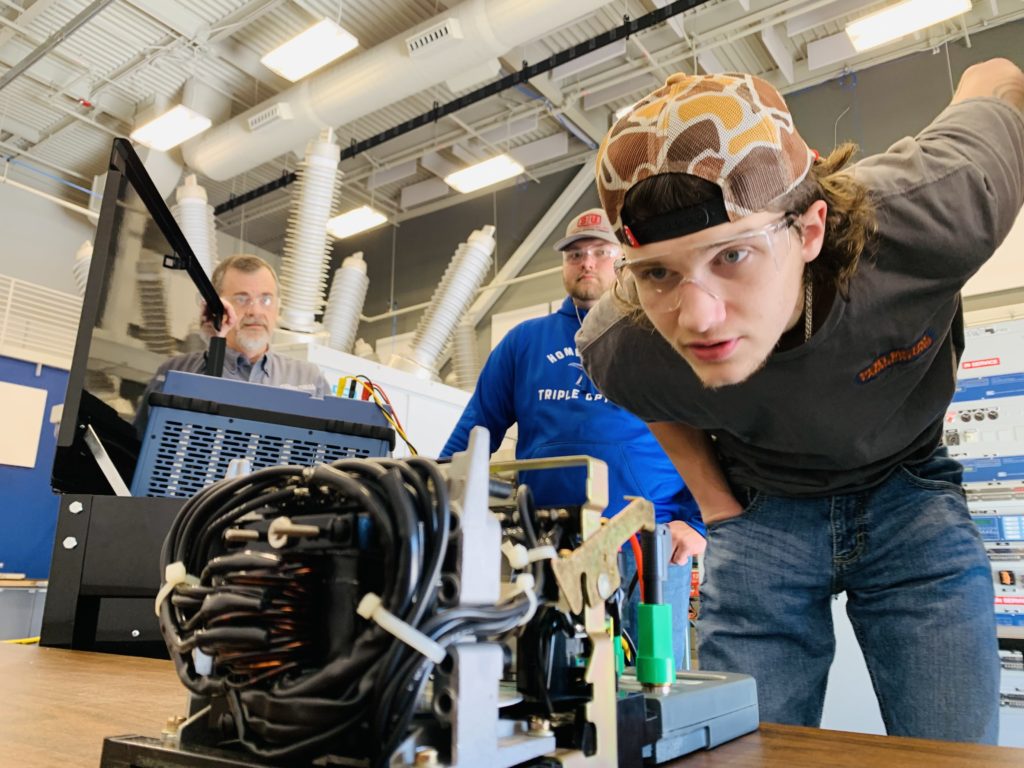
$232 million legislative request
Jason Hurst, president of Cleveland Community College, said such need is why the system’s legislative request of $232 million over the next two years is critical.
“We’re getting dangerously close to over-promising and under-delivering,” said Hurst, who also chairs the legislative committee of the North Carolina Association of Community College Presidents (NCACCP). “If we do not beef up our community colleges with the skills that we can provide, we’re going to be bringing companies here that we cannot provide a skilled workforce for.”
The system’s legislative request includes $86.8 million for a 7% salary increase for faculty and staff over the next two years and $145.88 million in student investment.
During the Board meeting, Hurst said the student investment funding will largely help expand existing programs or create new ones at each college. NCACCP President Dr. Jeff Cox said presidents are working to coordinate presence at the General Assembly this long session to help push the $232 million request forward. On March 29, the system will also host a legislative day to advocate for the request with lawmakers.
“We’ve got to meet these workforce demands – thousands of jobs that are going to require some kind of postsecondary credential,” Cox said. “You all know and I know that community colleges are uniquely positioned to meet that challenge. We just need the funding to be able to do it.”
On Thursday morning, several NCCCS leaders attended the General Assembly’s joint appropriations committee on higher education. That meeting included an overview of the NCCCS.
During that meeting, several legislators discussed the system’s declining enrollment trends and how community colleges can address workforce needs. Sen. Dean Proctor, R-Caldwell, raised the possibility of consolidating community colleges. Sen. Bobby Hanig, R-Bertie, said community colleges “provide an unimaginable resource,” particularly in rural regions.
“I think we’ve got a tremendous opportunity with the workforce needs that we have and the number of companies that are coming to North Carolina,” said Rep. David Willis, R-Union. “We’ve got a tremendous gap, as we know, in the number of skilled laborers and the folks that are coming out to be able to fill these roles. And I think we’ve got a tremendous opportunity to look more strategically at CTE, specifically in a partnership between K-12 and the community college system as we move forward.”
You can view the NCCCS overview presentation below, along with a list of each college’s FTE allocation.
Presidential search and personnel news
The presidential search committee provided a brief update on Friday, after formally beginning candidate sourcing last month. At that time, co-chair Dr. Shirley Carraway said the committee expected three to five weeks of candidate sourcing.
“We have been in kind of the quiet phase for the search, and that is the sourcing phase,” she said. “However, that is about to end.”
The search committee will start vetting candidates at their March 1 meeting, Carraway said. That meeting will include selecting candidates for face-to-face interviews, when possible. The committee anticipates eight to 12 applicants to consider, from in- and out-of-state.
Carraway said committee members should have applicant information the week before their next meeting.
Several Board members thanked Carver for his leadership during this time of transition for the system.
“Dr. Carver, you have built the trust and the confidence and respect of presidents, this board, and the staff,” said Member Tom Looney. “You’ve improved the morale and you’ve brought a new level of energy that I haven’t seen in the 18 months since I’ve been here.”
Board members also highlighted the new staff the system has recently hired, many announced on Friday.
David Chappell was recognized as the newest system information security officer and the ninth of nine IT security positions funded by a recurring $1.49 million allocation in the November 2021 budget. Mark Hagenbuch was announced as the new deputy director of the Small Business Center Network and Marcy Gardner as the new communications and social media specialist.
The Board also approved several personnel decisions:
- Lillie Rhodes, legislative liaison for the 2021-23 biennium. Rhodes will start in March and report to Alex Fagg, NCCCS director of government relations. The liaison position was approved at the Board’s January meeting.
- Emily Smail, director of research and evaluation. She will start April 1.
- Andrew Gardner, associate vice president of workforce strategies. He will start in March.
- Four finalists for the new president at Wilson Community College, who will announce those names early this week.
On Thursday, the accountability and audit committee said it had made an offer to an internal auditor candidate. By Friday morning, Committee Chair Mark Merritt said the candidate had accepted the offer and plans to start in March.
Last month, the Board had discussed the possibility of hiring an external auditor to complete necessary audits. On Friday, Merritt said he thinks the system is now on track to meet its audit deadlines.
Sullivan also announced one Board vacancy following Andy Penry’s recent resignation after nearly two years of service. Penry’s term was set to expire in June 2027. Gov. Roy Cooper will replace Penry’s at-large appointment.
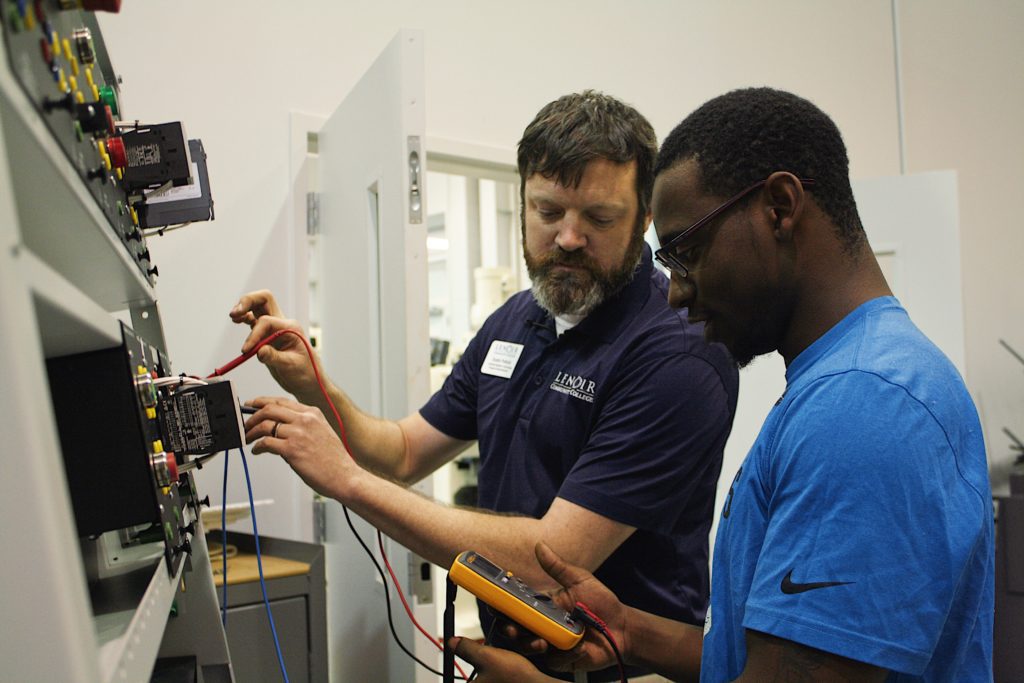
Moving ahead as a system
The Board continued discussing how to implement its 2022-26 strategic plan, “Leading through Change.”
Nathan Hardin, the NCCCS executive director of communications, said he is working to raise visibility of the plan internally and externally. There will be “a real uptick in implementation” in the coming weeks, he told the Board.
Hardin will also work with a consultant to develop a statewide marketing and communications plan. The Board approved allocating $130,000 of Board reserve funds toward that effort.
In the coming months, the Board also plans to form a marketing committee to discuss such initiatives.
The policy and governance committee briefly discussed Board engagement. In March, the Board will formally review a policy on how Board members can properly access information from system staff. Member Mark Merritt also mentioned wanting to formalize a policy on how complaints against senior managers and Board members can be made and reviewed.
The Board also approved modifications to its State Performance measure, with the stated purpose of “rewarding colleges that excel in supporting diverse students in achieving positive outcomes.” The third goal of the system’s new strategic plan is to “provide resources inside and outside the classroom for all students to successfully enroll, persist, and complete a career program of study.”
The approved modification will impact the indexing of the gateway English, gateway math, first-year progression, and curriculum completion state performance measures. Previously, indexing was based only on Pell- and non-Pell recipients. Now, the indexing will include four student groups: non-Pell/non-Minority, non-Pell/minority, Pell/non-Minority, and Pell/Minority.
“Historically, the North Carolina Community College System’s Performance Measure models have informed and incentivized college efforts to increase levels of student success. However, the impact student characteristics have on college success rates have not been considered when accessing and funding community college performance in North Carolina. This has unintentionally rewarded colleges with higher proportions of students with stronger academic preparation and certain socioeconomic backgrounds, while penalizing colleges serving more diverse student populations with lower success rates.”
Ann Whitford, chair of the strategic planning committee
Three Board members voted against the change.
Other meeting business
- The Board approved five institutions to offer the Elementary Education Residency Licensure Certificate Program, effective fall 2023: Alamance, Central Piedmont, Fayetteville Technical, McDowell Technical, and Western Piedmont community colleges. Blue Ridge and Wayne community colleges were approved in January. The colleges’ applications now go to the State Board of Education for approval. In addition, 57 of 58 colleges are now offering Associate in Arts in Teacher Preparation and Associate in Science in Teacher Preparation degrees, after the Board approved Roanoke-Chowan Community College to offer the programs, effective fall 2023.
- LaTasha Bradford, president of the N.C. Comprehensive Community College Student Government Association (N4CSGA), said she expects to present student survey results to the Board in March. This is only the second time the student government has surveyed students. “We not only need to hear about the (student) barriers that are before us,” Sullivan said. “But we need to be committed to overcoming those barriers and knocking them down.”
- The Board approved its legislative annual reports for Career and College Promise (CCP) and Cooperative Innovative High Schools (CIHS) for the 2021-2022 academic year. Read EdNC’s recent reports on CCP and CIHS to learn more. Next, the reports must go to the State Board of Education for approval.
- The Board also approved $5.6 million for each year for five years to fund career coaches in N.C. high schools. The coaches will work with students to determine career goals and identify the corresponding community college programs.
- The finance committee discussed three closed-session action items on Thursday: an amendment to contract for college information system enhancement and support services agreement, a contract for Extendable Identity Management Security platform, and a contract for managed services support for migration of system office applications. The full Board met in closed session for over an hour on Friday to discuss the same items. The Board did not mention the discussion once back in open session.
The full Board meets next on March 16 and 17. Sullivan said the Board will discuss coaching and advising during its issues luncheons the next two months, which will be led by the Belk Center.
Behind the Story
EdNC reporter Liz Bell contributed to the reporting in this story. She attended the General Assembly’s Feb. 16 joint appropriations committee on higher education, which featured an overview of the NCCCS.



